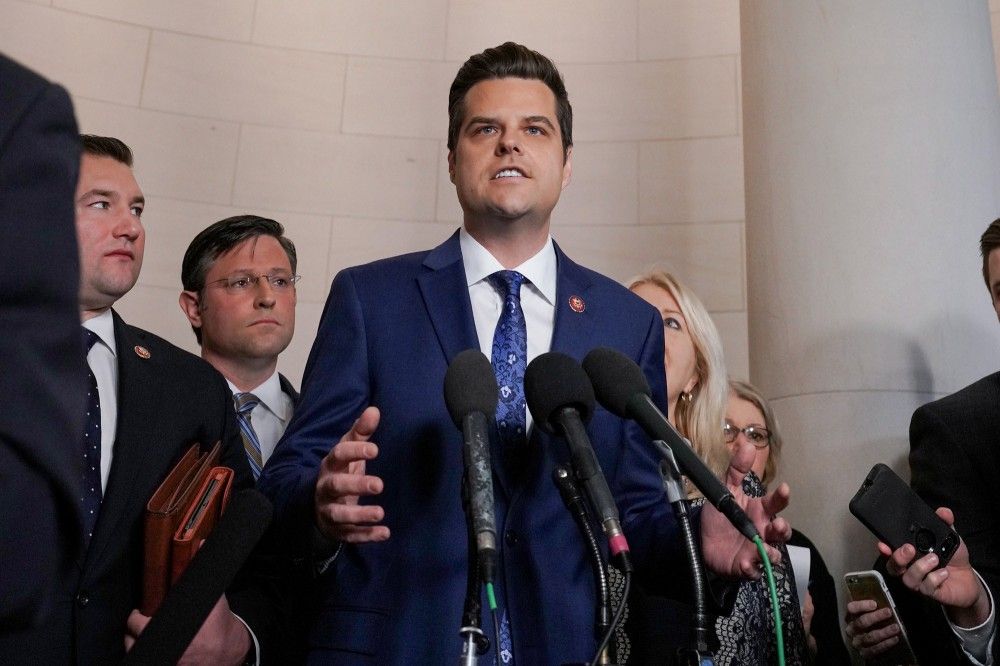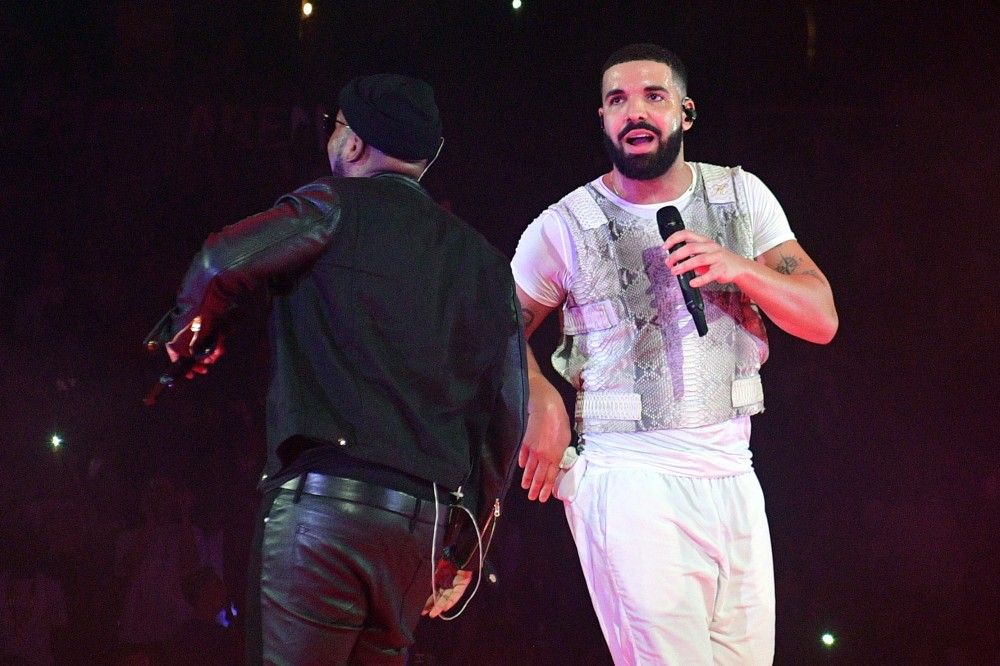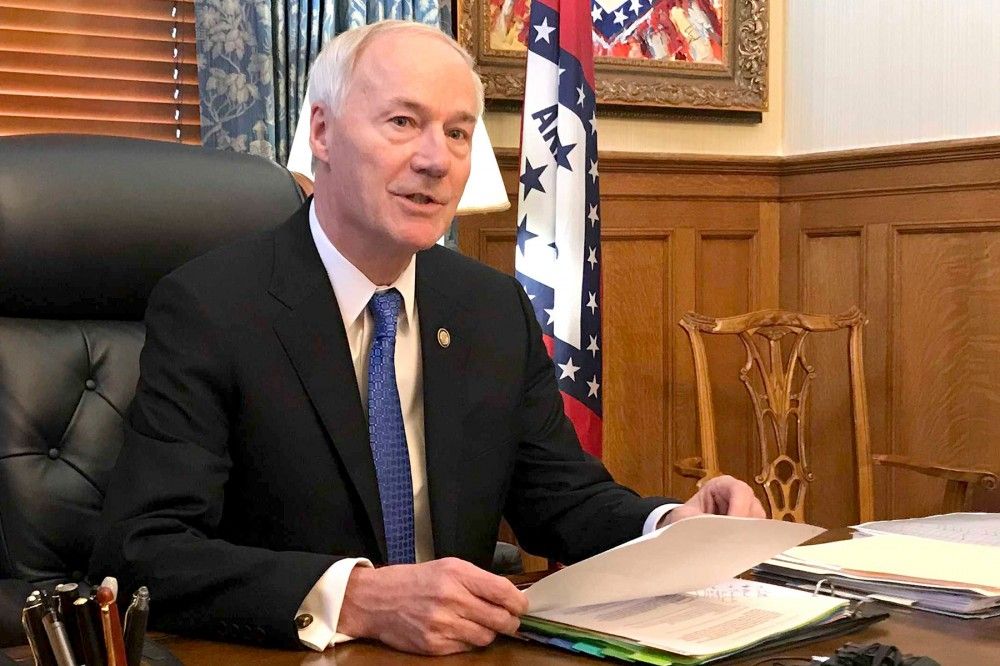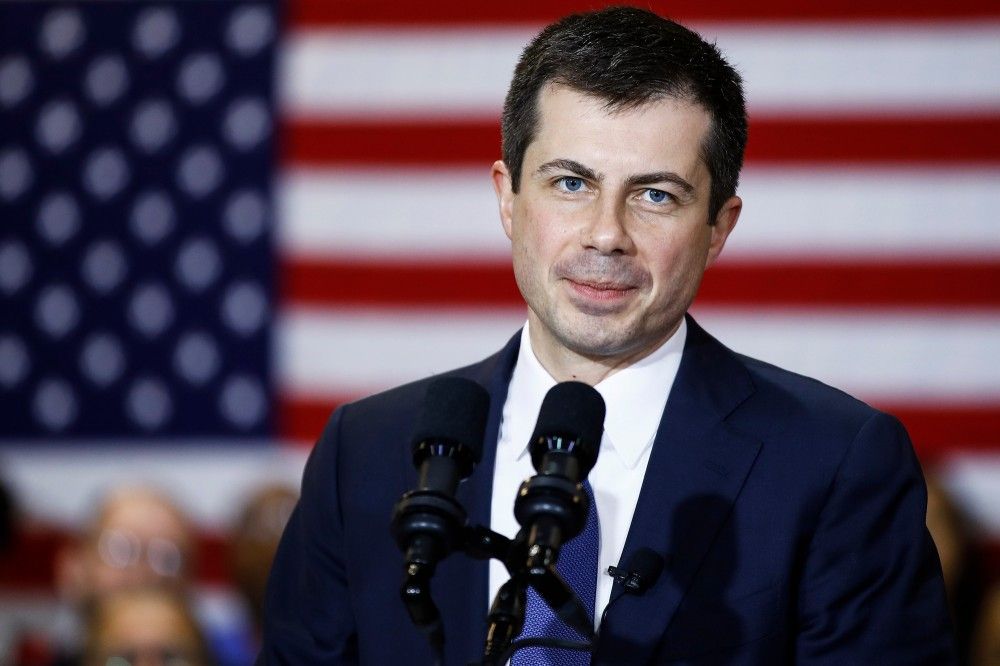
Matt Gaetz Is Having a Bad Hair Day
doesn’t want to shake my hand when I walk into his office. Considering what he is doing, I’m glad he doesn’t. “I don’t want to get concealer on you,” he explains, turning away from his mirror to greet me. “I promise I’m not doing this for effect for your interview.” A MAC Cosmetics case sits open on a nearby table. He turns back to the mirror and resumes dabbing his face. “Go right ahead with your questions,” he says.
Gaetz, a 37-year-old Republican congressman from Florida, is in a rush. It’s mid-January and a House procedural vote related to President Trump’s impeachment had run long. Now he’s due in a neighboring House office building for a Fox Business appearance. Before the vote, he’d done a hit for Fox News Radio and another for War Room, a podcast hosted by former Trump guru Steve Bannon, former Trump campaign staffer Jason Miller, and former Breitbart London editor Raheem Kassam. That evening, he’ll head to a studio to appear live on Hannity, the premier platform for any Trump-loving lawmaker. Gaetz is a regular guest.
Outside of maybe President Trump, there isn’t a politician in Washington who exerts as much care over his media presence as Gaetz, who since 2017 has represented Florida’s ultra–conservative 1st District, a swath of Panhandle known for its large military presence. He plasters his face across Fox News; he feuds with his enemies on Twitter; he orchestrates controversial publicity stunts like inviting Holocaust denier Charles Johnson to the State of the Union in 2018 (Gaetz later claimed he didn’t know about Johnson’s anti-Semitism), or introduces dead-in-the-water legislation to disband the Environmental Protection Agency. Following this year’s State of the Union, he announced plans to file a bogus ethics complaint against House Speaker Nancy Pelosi for ripping up a copy of Trump’s speech.
The result has been headlines, which are worth their weight in committee assignments in the reality-TV fun house Trump has fashioned out of Washington. Gaetz can’t seem to go more than a week or two without manufacturing a clickbait-ready piece of chum to throw to the press, which has largely obliged him.
“Look, after 10 months I figured out that you only really matter if you can move substantial sums of money, or substantial blocs of votes,” he says. “If you couldn’t do one of those things you are an extra in the movie in the United States Congress. I had no interest in that. I started to realize that to serve my constituents, I had to bring forces to bear outside of that traditional paradigm that they teach you in orientation.”
Gaetz has claimed it’s all done in the service of delivering “outcomes,” but what happens if what he’s trying to accomplish for his district doesn’t jibe with the president’s agenda? Trump’s haphazard carnival barking may have put him in the White House, but where will it lead Gaetz and others aiming to capitalize on the disoriented media landscape? Isn’t it inevitable that the endorphin-fueled drive to rack up engagement stats, to cater to the outrage-chasers, to get headlines at any cost, to own the libs, will hinder a lawmaker’s ability to make life better for the people they’re supposed to represent?
I ask Gaetz about this, but he doesn’t particularly care for the question, visibly taking offense at the suggestion that an agenda predicated on clicks should be carried out with caution. “It’s a hell of a note from a Rolling Stone reporter to tell me I’m too entertaining,” he snaps. “I guess I’ll take it as a compliment.”
He also, sitting in his office, has other things to worry about, and he’s still in a hurry. “I’m having a terrible hair day,” he says, “but we’re going to have to go anyway.”
“You’re bad luck,” Gaetz tells me once we arrive at the Cannon House Office Building’s rotunda. “This has never happened to us before. Hundreds of TV hits. Two years of doing it. We’ve never had a cameraman bail on us.”
The cameraman who was scheduled to shoot his spot on Making Money With Charles Payne is out to lunch — literally. Gaetz tells his chief of staff to text the producer. She already has. While we’re waiting, she shows me some of the metrics they keep of Gaetz’s media appearances. In 2019, he appeared on TV 264 times, with 174 of those appearances coming on Fox News or Fox Business. Gaetz talks about his media presence as if it’s a carefully curated financial portfolio, noting that he does around two MSNBC or CNN hits a quarter, and that he’s trying to diversify his presence with hits on platforms like Cheddar, the streaming news network founded in 2016. Everything is quantified. “If you don’t measure it, it doesn’t really matter to you,” he says.
“The great thing about social media is that you get instant feedback on the extent of your engagement,” Gaetz says. “I know within three minutes whether or not one of our tweets is going to be widely consumed. There are times when we’re able to inform the content of our social media based on the engagement.”
Over the course of so many media appearances, so many talking points tread and retread, Gaetz has attained a kind of flow state with his performative self. “I try to stay in a constant state of preparation,” he says. “Walking around here, a reporter can stick a microphone under your nose and ask you a question at any moment in time, and they frequently do with me. I think the relationship I’ve built with the press is that they expect an honest answer from me.”
Gaetz certainly makes his arguments to the press with conviction, but, as is the case with Trump, the bombast often seems to be in service of obscuring the truth. Throughout the impeachment process launched by House Democrats last fall, Gaetz enthusiastically cycled through a Rolodex of dubious talking points — that Trump is sincerely concerned about corruption, that the career officials who testified as part of the inquiry were not credible, that Intelligence Committee Chairman Adam Schiff is a liar who needs to be investigated — in an effort to absolve the president of any wrongdoing.
But part of the reason Gaetz has been able to elevate himself is that he’s willing to take it a step further, as he did in October when he put together a stunt in which a group of House Republicans stormed a Sensitive Compartmented Information Facility where Intelligence Committee members were deposing witnesses with knowledge of the Trump administration’s dealings in Ukraine. Gaetz’s move was arguably illegal, and at the very least set a dangerous precedent for ignoring rules to safeguard national security. Gaetz didn’t care, nor did he care about the need for the depositions to be conducted in private so witnesses couldn’t coordinate their testimony — something that, as a lawyer, he surely understood. But the move got headlines, and thus Trump’s approval.
This kind of fealty to Trump is at the heart of Gaetz’s media presence and political stature, and along with the president’s precious online nods and phone calls, it has garnered him IRL invites to Mar-a-Lago and the World Series, where Gaetz made sure to snap a selfie to broadcast back to his constituents.

“I figured out that if you can favorably impact the president’s perspective on something, you have the ability to impact outcomes beyond the halls of Congress,” Gaetz says. Photo credit: Pablo Martinez Monsivais/AP/Shutterstock
Considering Florida’s 1st District voted for Trump over Hillary Clinton by a 40-point margin in 2016, his strategy makes sense. “I think he’s a pretty calculating guy and that he’s looking to where the puck is going in his party right now,” says Steve Schale, a Florida Democratic strategist and friend of Gaetz’s for years. “I think he sort of plays for that audience. Matt, at his core, is a raw political creature.”
One of the reasons Gaetz is so effective at garnering media attention is that he isn’t simply mimicking Trump. Gaetz was just as controversial and liable to feud publicly with those who opposed him during his time in the Florida House of Representatives, where he served from 2010 until his election to Congress, in 2016.
“The issues were different and there wasn’t as much Fox News coverage, but you could argue he was doing the same things in the state Legislature,” says Schale, adding that Gaetz was a “disruptive force” who “wasn’t afraid to take a shot at his own colleagues” and that “there were people who grudgingly respected his ability to create his own news cycle.”
He was able to do this by occasionally bucking party orthodoxy — Gaetz has a strong libertarian streak and (at times) has expressed support for legalized marijuana and LGBTQ rights — but also by using his trollish social media presence. In 2012 he mocked “the gays” holding a “kiss-a-thon” to protest Chick-Fil-A’s anti-LGBTQ ownership. A year later, he lamented the sight of a woman whose back was “covered in tattoos” using a welfare card at a grocery store. In 2015, he singled out two black lawmakers from a group of 13 Florida state senators who filed a lawsuit related to the health care expansion, blaming them for what he felt was a poorly drafted lawsuit. The tweet drew bipartisan condemnation, and Gaetz issued a non-apology.
Gaetz’s father, Don, was a powerful figure in the state Senate, serving as president from 2012 to 2014. “The rub I heard on Matt Gaetz was that he always had an entitlement mentality,” says John Tobia, an ally and former roommate of Gaetz’s while the two served in the state Legislature. “Not necessarily financially, but heck, his dad was in leadership over there in the Senate. You heard that if that wasn’t the case then he wouldn’t be sending out tweets that were directly counter to leadership positions.”
Tobia makes clear that this isn’t how he felt personally, only that it was the sense he got from others whom Gaetz had rubbed the wrong way. This includes Cris Dosev, a Trump–loving combat veteran who ran for the House seat Gaetz won in 2016 before unsuccessfully trying to primary him two years later. “He had a lot of cover from his dad,” says Dosev. “The kid knows how to make sure he has an umbrella of protection over him, and he’s very effectively done the same thing with President Trump.”
Circling around the second floor of Cannon, I bring up the entitlement issue with Gaetz. This question, he doesn’t mind at all. “I think it’s a sign of strength, not weakness, to build strong partnerships,” he says. “Of course I was stronger in the Legislature because my dad and I worked together on projects. So was he. Of course I’m stronger in Washington because I work closely with the president. I don’t regret any of that.”
Gaetz performs his role as Trump’s pre-eminent impeachment defender during his spot on Charles Payne, which eventually goes forward thanks to a cameraman borrowed from Fox News. The segment begins and Gaetz comes to life, cycling through bite-size quips with the enunciation and energy of a boardwalk pitch man.
“We’ve been playing pin the tail on your favorite impeachment theory,” he says with a flourish. “It’s sort of like staring at the ink blot and hoping that you see the same thing they see,” he adds of the Democrats. “Like an addict can’t get off something they’re addicted to, Democrats can’t get off impeachment as their political strategy.”
But the conversation ends on a thorny issue for Gaetz: his decision the previous week to buck Trump and vote in favor of a House resolution to curtail the president’s war powers. He was one of only three Republicans to support the measure, and his office sent an email lobbying others to do the same, according to The Washington Post.
Many of Gaetz’s colleagues were shocked by the move, including House Minority Leader Kevin McCarthy, who implied on Lou Dobbs Tonight that Gaetz was a RINO, a Republican in Name Only.
I ask Gaetz if he was surprised by the intensity of the reaction from the right. “What reaction?” he says dryly. When I explain, he ultimately blames fake news. “I do think that some of the blue-checkmark brigade backlash on Twitter that you all in the media so predictably overreact to is non-organic,” he says, using the Trumpworld shorthand for “verified” Twitter users. (Gaetz is a verified Twitter user.)
“As a matter of fact,” he continues, “I got back a poll from the Florida Chamber of Commerce today, and Republicans in Florida would do unspeakable things for the numbers I have with the base.”
But the blowback over the vote was real, both in Congress and back in Florida. “A lot of people were very upset about that,” says Jeff Hinkle, GOP chairman of Okaloosa County, Florida, which lies in Gaetz’s district. “There was a lot of ‘Who can we find to run against Matt? He’s blown it. This is ridiculous.’”
Hinkle concedes the ire toward Gaetz in the panhandle is likely temporary, but the uproar is a reminder that residents of northwest Florida bow to the president and expect their congressman to do the same — unconditionally.
Though Gaetz claims his relationship with Trump is as rosy as ever, the president was clearly frustrated. When the White House released a list of eight House Republicans to assist with his impeachment defense in the Senate, Gaetz wasn’t on it. He chalked up the omission to a personal vendetta by Trump adviser Eric Ueland. “I don’t know why it would serve someone in the White House to manufacture a divide between the president and one of his best communicators during impeachment,” Gaetz told Politico.
But there were other indications Trump wasn’t happy. The Post reported Trump “fiercely complained” about Gaetz after he learned of his lobbying efforts, and Gaetz didn’t appear on the president’s Twitter feed in any form for nearly a month following the January 9th war-powers vote. But Trump did acknowledge him on February 6th during an hour-long victory speech delivered the day after the Senate acquitted him of impeachment charges. A day later, Trump resumed retweeting Gaetz’s praise and clips of his media appearances. That weekend, Gaetz posted a fresh selfie from Mar-a-Lago. He was wearing a Trump International Golf Club polo.

Gaetz gives a thumbs up to Trump after being introduced during the president’s remarks regarding the Senate vote to acquit him of both articles of impeachment in the East Room of the White House. Photo credit: Shutterstock
Assuming Gaetz is back in the fold, it will be interesting to see if he’ll dare take another stand against a president who demands total supplication, and whose endorsement is arguably more valuable to Gaetz than anything he could accomplish legislatively for his constituents — like, say, voting to constrain the president’s war powers on behalf of the military members and their families in his district.
Gaetz has also split with his party on climate change, an issue of pressing relevance to his Gulf Coast district. While he undercut any serious claim he might have to being an environmentalist with the stunt bill to abolish the EPA, he recognizes the validity of climate science. But he rarely brings it up when he’s in front of a microphone. “It’s a fair critique that I’ve been unsuccessful in convincing many of my Republican colleagues about the challenges associated with climate change,” he says.
It took a while for Gaetz to find his footing in a Washington tailor-made to beat the idealism out of young lawmakers. He describes his first 10 months in Congress, which he says included only one television hit, as “frankly some of the most unhappy times of my entire life.”
Gaetz’s disgust with how Congress works matches what many lawmakers say — though typically not on the record. “What I hated is that you were supposed to spend most of your time at bended knee for the lobbying corps,” he continues. “Either sucking up to them for money, or serving as their valet in the halls of Congress. I hate doing both of those things.”
So, as Schale describes it, Gaetz “set himself on fire,” blitzing the airwaves to defend Trump in the face of the Mueller investigation, casting the lone “no” vote against an anti–human trafficking bill, appearing on the radio show of conspiracy theorist Alex Jones, and inviting Johnson to the State of the Union — in just over a month. The media’s attention quickly followed. So did Trump’s. “It’s almost a function of growing up in a powerful political family,” Schale says of the means Gaetz took to make himself relevant. “He’s not used to his voice not mattering.”
Gaetz says his affiliation with Trump has made him a power broker. “I figured out that if you can favorably impact the president’s perspective on something, you have the ability to impact outcomes beyond the halls of Congress,” he says. “I became aware that the president was frustrated with the Paul Ryan view of congressional service in the Trump era, which was that Trump was a condition to be managed. I view it as an opportunity to be seized, to break from the shackles of this place and actually engage and excite the public, and also have substantial impact on the administration in a good way.”
To what degree Gaetz is able to “impact” the administration is unclear. And is he really so unshackled if he isn’t even able to advocate for a constitutionally conservative position like giving war powers back to Congress without Trump blackballing him?
When I ask Gaetz if there are any Democrats using new media effectively, he cites Rep. Alexandria Ocasio-Cortez. But, unlike Gaetz, her internet savvy and gift for online engagement has allowed her to push party leadership to keep its promises to constituents and institute the type of big changes that make the party’s traditional industry allies uncomfortable. Gaetz, on the other hand, says the feedback he’s received from GOP elders has mostly been “encouraging” as the party has now congealed around “Drain the Swamp” messaging while embracing lobbyists en masse. As of 2019, Trump had appointed 281 lobbyists to his administration, four times as many as Obama appointed in his first six years, according to ProPublica. This is what Gaetz, who bemoans the influence of special interests in Washington, is supporting.
Gaetz relishes the idea that he is a contrarian firebrand who wants to subvert the political establishment, party be damned. But unlike with his father, the cover he’s received from Trump is far from unconditional. Gaetz may not have as much leeway to stray from the orthodoxy of the new establishment that’s been created around Trumpism, which seems just as oppressive as the “traditional paradigm” that frustrated Gaetz when he arrived in Washington.
But he’ll always have his engagement metrics, which he can goose at any time with the flick of a tweet. Two days before I meet him in Washington, he generates headlines after attacking Chris Latvala, a nemesis from the Florida state Legislature, for posting a picture of himself with Al Sharpton. Latvala fired back, accusing Gaetz of starting a contest while he was in the state House in which lawmakers were awarded points for sleeping with various categories of aides and legislators. Gaetz denied any knowledge of the game. After his spot on Making Money, I ask him why he felt the need to attack Latvala, which only seemed to result in speculation that Gaetz was behind a demeaning sex game.
“He was bestowing honor to Al Sharpton, someone who deserves no such honor,” Gaetz says, later slipping in that Latvala’s “dad was against much of what I was doing in the state Legislature.”
This often seems to be the point for Gaetz, to demean those who oppose him, lib or otherwise, even when there are far more important issues at hand. I bring up a heated exchange in the Judiciary Committee last fall in which Gaetz repeatedly dredged up what he viewed as racist remarks Sharpton made decades ago. Sharpton had been called to Congress to discuss policing practices alongside Gwen Carr, the mother of Eric Garner, an African American father who was killed on camera in 2014 after being put in a police chokehold, famously pleading to the officer, “I can’t breathe.”
Gaetz’s badgering of Sharpton drew rebukes from committee Democrats, who argued the line of inquiry was “non-germane” to the life-and-death issue at hand. Gaetz had a different take on how his turn questioning Sharpton went. “That,” he beams, “was one of our most highly viewed YouTube videos.”



